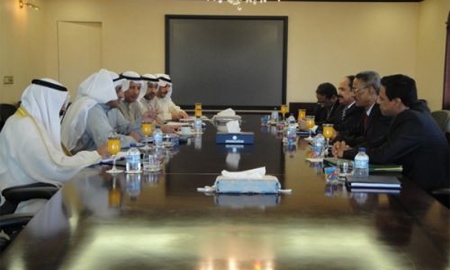
Kuwait Fund For Development is the first institution in the Middle East that took an active role in international development efforts.
The Kuwait Fund extends loans on concessionary term to finance development projects in developing countries. The Fund also provides technical assistance to finance the costs of the feasibility studies of projects, as well as the training of citizens of the borrowing countries. In addition, the Fund contributes to the capital of international and regional development institutions.
Today, the Kuwait Fund forms a solid bridge of friendship and solidarity between the state of Kuwait and developing nations.
The Kuwait Fund for Arab Economic Development (KFAED) was established in 1961, the same year as the country’s independence, and set a benchmark as the first aid agency from a developing country.
With Kuwait’s willingness to share its wealth with others, KFAED has grown to become the Kuwait’s main channel for foreign assistance, far surpassing United Nation targets for development support in relation to national GDP.
Kuwait has an active role in the international arena; a role that expresses its goodwill and peaceful aspirations. Therefore, KFAED supports international initiatives and institutions aiming to achieve international development and stability.
KFAED complements Kuwait’s foreign policy through its development cooperation with more than 100 developing nations. It also contributes to strengthening friendships between these countries and the State of Kuwait. Kuwait’s contributions to other international development institutions, such as the Arab Fund for Economic Development, the African Development Bank, the International Fund for Agricultural Development, and the International Development Association, are normally provided through KFAED and through the agency’s own resources.
Objectives
The object of the Fund is to assist Arab and other developing countries in developing their economies.
Types of Activities
Scope of Operations
The Fund's operations are focused primarily on the sectors of agriculture and irrigation, transport and communications, energy, industry, water and sewage.
Eligible Entities
The Fund may extend its assistance to different types of entities which include:
(Where the Borrower is an entity other than the state in the beneficiary country, the Fund usually requires that the state in such country enters into an agreement with the Fund whereby it guarantees the performance of the borrower's obligations under the respective loan agreement.)
Forms of Assistance
Available funding for addressing climate change and other environmental issues is but a fraction of what is needed, and carries with it a whole host of considerations. Since its establishment in 1961, the Kuwait Fund for Arab Economic Development has supported developing countries in improving the well-being of their people. It started operations in the Arab world and has expanded since the mid-1970s, to reach today into over 104 countries worldwide. In this time, the Fund has participated in financing priority infrastructure projects in the transport, communication, energy, agriculture, education, health, water and sanitation sectors via a raft of concessionary loans, technical assistance and grants, totalling US$15 billion.
Environmentally-friendly operations
countries carries a potentially negative impact on the environment and human welfare in those countries. Hence, such growth needs accompanying policies that carefully scrutinise the environmental impact of each project and ensure all the necessary mitigating measures are adopted. Projects with environmental preservation and indigenous resource development receive high priority during decision-making on financing new projects.
The protection and improvement of the environment have always been a major concern to the Fund and are critical, prerequisite elements in determining whether the Fund will participate in financing a project in any development sector. At preliminary approval and project appraisal stages, the Fund requires, in addition to the technical and economic feasibility studies, an environmental impact assessment report identifying mitigating measures that need to be adopted at the design, construction and operation stages of the project. The Fund’s loan agreements include a special condition requiring the borrowers to take all necessary action for the protection of the environment and to ensure that the Project is carried out and operated in accordance with sound ecological and environmental practices.
The Korle Lagoon Restoration (Ghana), the River Blindness (Onchocerciasis) Control Programme (West Africa) and the Aral Sea Water Supply Project (Kazakhstan) are few examples of these projects financed by Kuwait Fund. For decades, Korle Lagoon in Ghana’s capital, Accra, was used as an open sewer and convenient disposal point for all solid and liquid waste. The net result of this was that the downstream water flows became blocked and the low-lying areas, basins and the lagoon itself were receptacles for the waste driven down by the flooding water. The impact of the ensuing decomposition on the surrounding ecology included a total lack of dissolved oxygen, resulting in an almost complete disappearance of marine life.
In June 1995 and May 2000, Kuwait Fund extended two loans for a total amount of US$24.6 million (the largest contributor) to the government of Ghana to finance the project for the ecological restoration of Korle Lagoon. The project’s implementation cost US$60 million.
While poor and underdeveloped countries are striving to secure their basic needs, the world is forced to face the rapid expanding environmental crisis resulting from climate change. The Kuwait Fund calls on all industrial countries (China, India and other major consumers of fossil fuel) to work urgently and together on the reduction of their greenhouse gas emissions, while simultaneously helping developing nations in achieving sustainable development. The flexible mechanisms for emissions reduction, defined by Kyoto Protocol, are effective measures that need to be applied and extended as a road to a better world, and Kuwait Fund supports every effort that can enhance the application of these measures within its development objectives.
2 COMMENTS
Are there any forms to apply to the Kuwait
Fund.?.
sam Rajasuriar.Director.
Are there any forms to apply to the Kuwait Fund